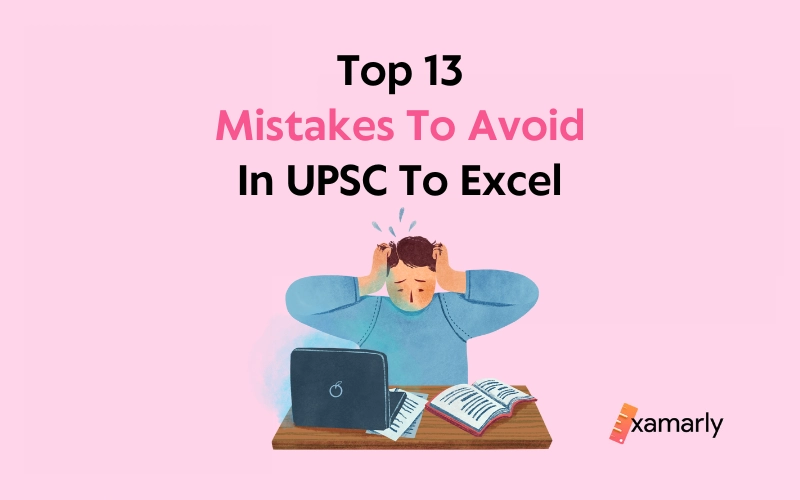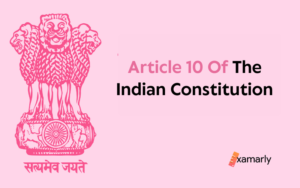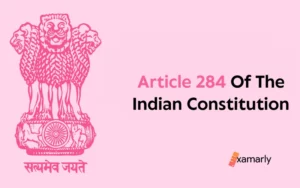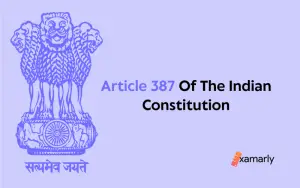” Isn’t it nice to think that tomorrow is a new day with no mistakes in it yet? “
-L.M. Montgomery
Making mistakes is common in human nature. Working on one’s mistakes is something that is rare these days and the one who follows the rule of “commit, learn and move ahead” is the one who gets all the success in his/her life.
The UPSC full form is Union Public Service Commission. This exam is one of the nation’s most competitive exams. It is an exam of excellence where aspirants are prone to commit some common mistakes while preparing for it. Before it gets too late & negative marking affects you, you need to know about the mistakes to avoid in your UPSC preparation strategy.
Repetitive mistakes will definitely harm your preparation and motivation which are needed in this journey of becoming a Civil servant.
However, it is also true that when embarking on this journey, it is critical to remember that one should not be afraid of making mistakes because one cannot avoid making them easily.
The important thing is that one must continue their journey. Here we are providing you with a list of 13 common and 2 bonus mistakes to avoid in UPSC preparation journey. If already done, that needs to be rectified instead of getting demotivated.
- 13 Most Common Mistakes to Avoid in UPSC
- 1. Not Referring to the UPSC Syllabus Properly
- 2. Making an Inadequate Study Plan
- 3. Not Focusing on an Integrated Approach
- 4. Wrong Choice of Books
- 5. Not Making the Most Out of NCERTs
- 6. Ignoring the Importance of Newspapers
- 7. Not Making Quality Notes
- 8. Not Managing Your Time
- 9. Not Choosing the Appropriate Optional
- 10. Not Giving Ample Time for Revision
- 11. Leaving Mock Tests out of Your Preparation
- 12. Not Using Question Papers from Previous Years Correctly
- 13. Longer Study Hours
- Bonus Tips: Mistakes To Avoid In UPSC
- Conclusion
- FAQs About Mistakes to Avoid in UPSC
13 Most Common Mistakes to Avoid in UPSC
Go through the lists of the mistakes to avoid in UPSC that are discussed below in brief so that you can prepare for UPSC CSE efficiently.
1. Not Referring to the UPSC Syllabus Properly
There’s a reason why the Syllabus of UPSC CSE is humongous in structure. UPSC checks not only your knowledge but also your thought process, your opinions on a particular issue, and your awareness of course. The first on the list of mistakes to avoid in UPSC exam preparation is not going through the syllabus properly.
It’s not only about the subject and topics, but a syllabus also informs you about the exam format, and avoiding this thing may harm your preparation. Many aspirants mindlessly follow one or more online mock exam series that may not be up to date with the most recent UPSC CSE syllabus.
2. Making an Inadequate Study Plan
To excel in such a prestigious exam which will finally lead you to become a Civil servant of this country demands planning. Planning is basically the blueprint or a roadmap of your UPSC CSE journey.
It necessitates the creation of an organized, friendly study schedule with hourly, weekly, and month-to-month goals that concentrate on various topics from the UPSC CSE syllabus. There are multiple ways to plan out and it all depends on your understanding and thought process.
If the problem persists then you can also try a different way of planning out with Examarly. Based on AI customized planning features it will definitely help you in sorting out your weak areas and make a plan for you so that your time is saved for other important activities related to your preparation.
3. Not Focusing on an Integrated Approach
This is another mistake to avoid in the UPSC. The error is that they concentrate solely on one step at a time; for example, they believe that since the UPSC CSE preliminary test is the first phase of the exam, preparation for UPSC Mains should begin after giving UPSC CSE Prelims.
This is not the right approach, rather an integrated approach should be taken. Inclusion should be there i.e. researching and making notes of common areas between Prelims and Mains is the key.
To excel in the UPSC CSE, every applicant should prepare well. As there isn’t much of a time difference between the two examinations, you can prepare for both the UPSC CSE Prelims Exam and Mains Exam at the same time.
4. Wrong Choice of Books
An aspirant must have knowledge of proper and relevant books for preparation for UPSC CSE. Collecting different books for only one subject will not help you. It will only create confusion. Only reading a book should not be the target instead you should put more effort into comprehending the ideas.
Quality always matters more than quantity. Wasting too much money on unnecessary books just to encircle yourself with their stack is not a good idea. It will simply make you feel overwhelmed and produce useless outcomes.

5. Not Making the Most Out of NCERTs
NCERT– published books are the go-to source for any civil service aspirant. Aspirants usually don’t know exactly how to read NCERTs. It’s not always necessary to read every NCERT of every subject. All it takes is proper research to know your weak areas so that you could know how to read 6-12 NCERT for UPSC in a proper manner.
6. Ignoring the Importance of Newspapers
Ignoring the newspapers is another on the list of mistakes to avoid in UPSC preparation. “Read the newspaper daily” is perhaps the first piece of advice you get when you start your UPSC CSE preparation as it helps you to be updated with current affairs.
Reading is not enough as newspapers have huge and different sorts of information. Therefore, it’s a necessity to properly align your reading with your UPSC CSE syllabus. Not doing this properly will prove to be a huge mistake.
Current affairs reading and gathering relevant information is very necessary for an aspirant. Usually, aspirants feel a sense of confusion when reading the right newspaper. It’s not necessary to read solely that newspaper which is read by everyone.
Just search a little bit and you can even go for the newspaper in the Hindi language also. The catch is to grab the right newspaper with relevant information which you can understand well.
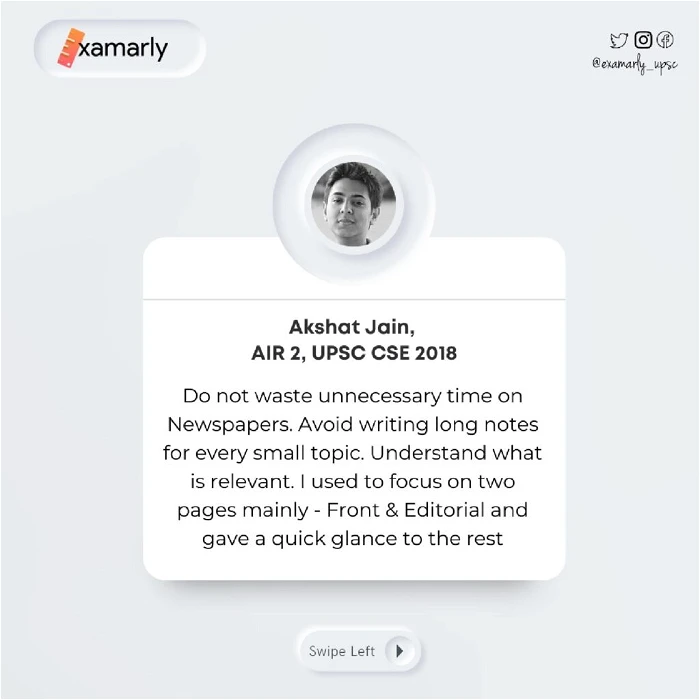
Related Articles-
7. Not Making Quality Notes
Making notes that are to-the-point, compact, and easily accessible is the important key to better preparation for UPSC. They come in handy when you revise the complete syllabus before the exam. You cannot revise humongous books just before the exam, but you can do it with handmade notes instead of digital notes for UPSC.
Studying and revising through compact notes will help you most particularly a day or a week before the exam. Failure to take these notes is one of the most common mistakes to avoid in the UPSC. Your preparation time can be cut down with this simple tip.
8. Not Managing Your Time
Time management for UPSC is one of the best exam-taking tactics, whether it’s for the Civil Services exam or any other exam. In the case of the preparation for the UPSC or IAS examination if time management is not done properly then your situation may become a curse for you.
With such a large syllabus you can’t just read anything you want and sit in the exam wasting your chance. You must look through the entire syllabus and create schedules for various topics and papers. Constant and serious time management is required to crack this prestigious exam.
9. Not Choosing the Appropriate Optional
One of the most typical mistakes that applicants make each year is this one. The optional subject consists of two optional papers. Marks scored in these two papers determine your position in the final score list.
Selection of the Optional subject for UPSC should not be based on the herd mentality. It demands your interest in that particular subject or maybe you have studied that subject in your graduation. It is a subjective choice and changes from the aspirant to the aspirant.
Your selection may depend on the factor of availability of study materials in the market or online but it should definitely not be based on absurd reasons. An aspirant needs to be conscious and careful enough to choose the right subject which is definitely going to affect the final result.
10. Not Giving Ample Time for Revision
Not giving sufficient time to revision is another on the list of mistakes to avoid in UPSC. Whether you are a self-learner or studying in any coaching institute, you definitely need a revision before jumping to the other topic. With such a vast syllabus and complex structure of UPSC CSE, you are required to make up your mind to not only read the text but also to understand the context.
A great revision strategy for UPSC always helps build a fresh flow of knowledge. It adds a fluent flow to your memorising skills of basic concepts, single topics or even complex subjects.
You have to be a student who revises and understands something new on a regular basis because only memorizing the facts will not benefit you. Multiple revisions and regular practice are mandatory to be capable enough to score really good in the actual examination.
11. Leaving Mock Tests out of Your Preparation
Another common mistake committed by many candidates is that they won’t practice mock tests before UPSC. Scientists perform several testing before attempting a serious experiment. This is required in every field whether it’s a scientific experiment or an exam like UPSC CSE.
Testing is very necessary to understand the complexity of the examination. Mock question paper is a simulation of the actual IAS exam and they will surely benefit you in the long haul. Testing your weaker and stronger areas will tell you a lot about your preparation and you can easily map out the strength & scope of improvement.
You Might Also Like To Read: IAS Full Form.
12. Not Using Question Papers from Previous Years Correctly
Previous year’s question papers are an excellent resource for understanding the UPSC exam pattern and getting a broad concept of how questions are structured. Doing this along with taking mock exams will save you from surprises in the actual exam.
Although the nature of the UPSC CSE exam is not very certain, even then you will get a general idea of how all of the syllabi will fit into the actual exam paper. So you must always finish the curriculum before attempting the questions from previous years. This way you can assess your preparation level and also learn about the exam process.
13. Longer Study Hours
Although completing the entire curriculum for UPSC is a mammoth task, that fact must not allure you to become a machine and make you sit and study for hours without a break. Studying for long hours without breaks will only be proven harmful in the long haul.
A good technique is the Pomodoro technique. This is a simple technique to follow but has huge results for your attention span and time management routine from its application.
All you need to do is a study for 25 minutes and give yourself a snack break or eye break for a maximum of 5 minutes. After 3-4 such work cycles you should take a longer break of 15-20 minutes.
If this is too much for you to remember, download a Pomodoro timer from your app store. This way you won’t have to keep a tab on the work and break time by continuously looking at the clock. Many studies done on attention span and retention power shows that taking breaks will improve your efficiency and retention power.
Bonus Tips: Mistakes To Avoid In UPSC
The Civil Services Examination, popularly known as UPSC, is one of the toughest exams in India. If you are going to apply for it, then read this bonus tip.
1. The 15 Hours Trap
The worst preparation error for the UPSC is assuming that 15 hours are required to study for the CSE. Many people do say this and this might be true for some people. But every person is different, their limits of physical and mental exhaustion are different. Everyone is different and so should their study strategies.
If you stretch out the study time beyond 10 hours, it could hamper your physical and mental health. It will affect your energy levels and will affect you gravely on the actual exam day.
2.The Pomodoro Technique
Another bonus tip for mistakes to avoid in UPSC is students do not follow the Pomodoro technique. It is a way to manage your time efficiently and increase your retention power.
Following this is a simple task of studying for 25 minutes and taking a 5-minute break for up to 4 work cycles and then taking a 15 minutes long break.
Taking breaks is not a waste of time, on the contrary, it is a way to increase your study efficiency and retention power. Not taking breaks should be at the very top of your list of mistakes to avoid in UPSC.
Conclusion
We discussed the list of mistakes to avoid in UPSC as a road map for your UPSC preparation. All these, if avoided, can help you supercharge your UPSC Civil Services exam preparation journey. The key takeaway from these should be that your health is of utmost priority, and that can be taken care of by following a good time management routine and taking ample breaks in between study sessions.
Making thorough notes, taking practice exams, working through questions from prior years, and choosing the correct study materials are all effective ways to study well. This list is the least we can do to keep you grounded on the possible mistakes you or anyone can or are committing in your exam preparation. We can now be confident that you are aware of these mistakes and will avoid them when preparing for the UPSC.
FAQs About Mistakes to Avoid in UPSC
Should we rely totally on coaching classes?
While coaching classes can be helpful, they should not be the only source of your preparation. You should also make use of books, online resources, and mock exams to supplement your learning.
What are the extra precautions to be taken for acing the UPSC?
The UPSC exams can be mentally and physically demanding. Make sure you take care of your health by eating well, exercising, and getting enough sleep.
What to do during a loss of focus/motivation?
The UPSC journey can be long and challenging, but it is important to stay focused and motivated. Surround yourself with positive and supportive people, and take regular breaks to recharge.
What should the regular practice sessions include?
Make sure you practice writing essays, answers to objective questions, and mock exams to familiarize yourself with the exam format.
What is the importance of current affairs in the UPSC exam?
Being updated with current events, especially those related to the syllabus, helps a lot as they carry a significant weight in the exams.


